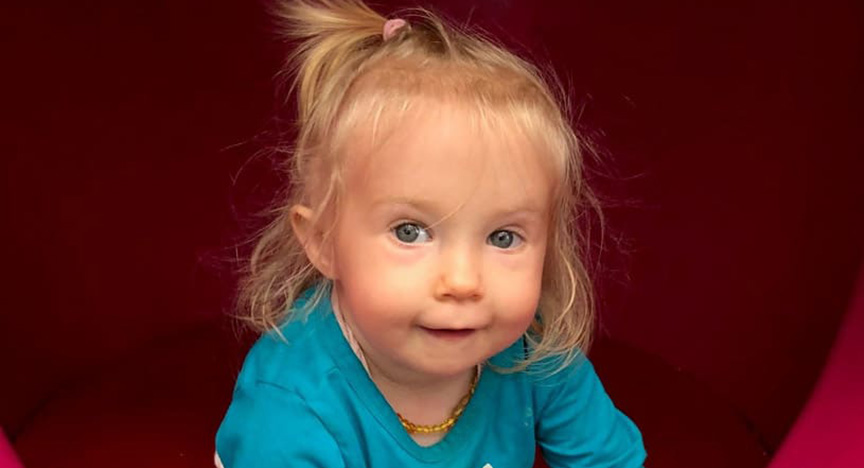
When Amy was born, her parents Karen and Brendon were overjoyed to give their son a little sister. However, their joy soon turned to nervousness after doctors diagnosed Amy with 22q11.2 deletion syndrome, a rare disorder caused by the deletion of a small part of chromosome 22, which left Amy with a cleft of the soft palate.
“We were scared – we didn’t know anything about a cleft of the soft palate but knew Amy would fight her way through this,” Karen said.
The soft cleft palate or ‘roof’ of the mouth is located directly behind the hard palate. A cleft (opening or split in the roof of the mouth and lip) in that area affects normal eating and swallowing, pronunciation of specific words and doesn’t provide a sufficient barrier to food, which may cause choking.
“Amy was unable to suck – like sucking through a straw with a hole in it,” Karen said.
“This made it very difficult for her to feed with a bottle or breast feed. We tried many different bottles and teats and found that Amy got more air than food. The pressure we felt as parents unable to provide enough food for Amy was becoming difficult.”
At five weeks old, Amy began tube feeding – a way of getting the body the nutrition it needs with liquid nourishment via a tube – to help her gain weight. She then continued to be fed through the bottle with a special teat suitable for her.
“We were then referred to a speech pathologist to help more with her feeding. They provided me with a recipe for thick custard to help with increasing the calories in Amy’s food. They also provided me with a special cup with two handles so that Amy would be able to hold this herself, so she would drink water or juice to help increase her fluid intake,” Karen said.
As Amy continued to see the speech pathologist, she became more confident with her eating.
At 11 months, Amy underwent surgery to have her soft palate repaired, which has resolved her eating and drinking difficulties.
Now that her palate has been repaired, Amy will now have speech therapy to help her with speaking, which involves play-based exercises and singing songs that encourage the use of making noise through her mouth rather than her nose. Amy will continue to see her speech pathologist and cleft palate team until she is 18.
Now 20-months-old, Amy continues to do her favourite things: watch the Wiggles, dancing and playing at the park.
“Amy inspires us every day with the challenges she has faced in her early days and showing us that nothing will stop her. She is growing up to be a very strong, confident little girl.”